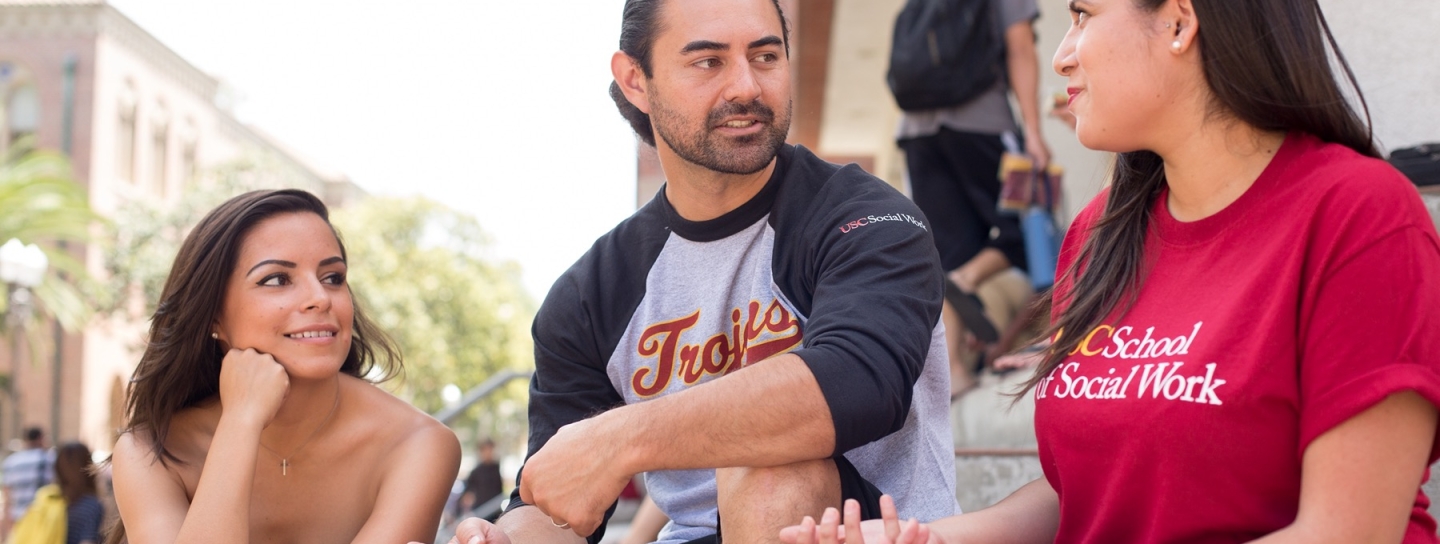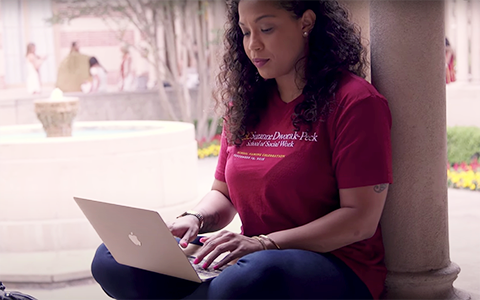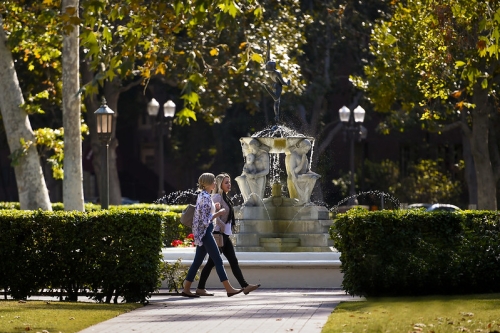
About the MSW Program
Our MSW Program
The University of Southern California consistently ranks among the nation's top accredited social work graduate programs in U.S. News & World Report. For decades, as a faculty, we have delivered bold, principled, and forward-thinking training to social workers. We build upon our history and our distinct practice to advance our field. We are innovators and changemakers. Our MSW is designed to empower our graduates to see and understand their clients through a holistic, nuanced and dynamic lens. Culturally-responsive and evidence-informed practice has always been the core focus.
Our Integrative Social Work curriculum redefines traditional silos of courses by seamlessly blending practice, policy and research within real-world scenarios. Designed for individuals eager to make a difference, our program takes a holistic approach to education, recognizing the complex challenges faced by different populations within intricate environmental systems.
Through immersive learning experiences such as case studies and simulations, students engage with the multifaceted nature of professional practice. They collaborate across disciplines, drawing on social work theory, policy analysis and empirical research to craft comprehensive solutions. This integrative approach not only equips students with the skills to address the interconnected needs of individuals, families and communities but also incorporates historical, cultural and political perspectives.
By understanding and addressing these differences, students are empowered to develop effective interventions and advocate for social good. This comprehensive training fosters critical thinking, creative problem-solving and empathy, enabling graduates to navigate contemporary social work challenges with confidence and competence.

MSW Program Mission
The mission of the MSW Program is to empower students to tackle local, national and global challenges with integrity, resilience and humility to achieve social, economic and environmental opportunity. We equip our students using integrated social work education to catalyze positive social impact and enhance the well-being of all by focusing on the needs of individuals, families and communities. Valuing evidence-informed practice, service, ethics and respect, we guide our graduates to actively contribute to a better world.
Ethics and Professional Conduct
At USC, ethical and professional conduct is of paramount importance in all aspects of our social work program. We are dedicated to fostering an environment where integrity, accountability and respect are integral to the learning experience. Our commitment to these principles ensures that our students are well-prepared to navigate the complexities of social work practice with a strong ethical foundation. By upholding the highest standards of professionalism, we prepare our graduates to make informed, ethical decisions that positively impact the communities they serve, reflecting the core values of USC and the social work profession.
These values are reflected in our coursework. Our MSW program includes signature courses that emphasize our commitment to preparing students for complex client care and critical decision-making. SOWK 510: Professional Self-Care, Wellness, & Resilience in Integrative Social Work Practice equips students with strategies to maintain their well-being while managing demanding client interactions. SOWK 511: Critical Decision-Making in Integrative Social Work Practice enhances students' abilities to navigate complex situations and make informed, ethical decisions, ensuring they are well-prepared for the challenges of integrative social work practice.
Code of Integrity and Accountability
How We Support You
Student Support Services
Student advisement begins prior to enrollment in all program options. An orientation is held for all new incoming students. Students are able to hear from school leadership about the curriculum, policies, procedures and academic expectations. An admission counselor is assigned from the time of recruitment until the 3rd week of classes; admission counselors speak with students about the program and careers in professional social work, as well as next steps in the admission and enrollment processes.
Following admission, students are assigned an academic advisor who is either a faculty member or a member of the school’s staff. The formal structure for academic and professional advising and student support includes the student’s staff academic advisor, their practicum faculty liaison, and the assistant dean for student affairs. If a student wants further support, they can reach out to a member of our Academic and Career Enhancement (ACE) navigator team or the workforce development office for professional development counseling or guidance with stipend programs. For additional support with wellness needs and connection to resources, our student wellness coordinator is available.
At the end of each semester, students who have failed to meet all of the academic requirements are required to schedule an academic review meeting with the assistant dean of student affairs. Students have an opportunity to share their perspective on anything that contributed to their not having met the expectations. Academic plans may be modified going forward with an aim toward supporting the student's academic success and completion of degree program.
Academic and Career Enhancement (ACE) Team
The ACE Team is committed to empowering the School's students and alumni by providing general academic advising and career readiness resources. As the first point of contact for those seeking support, we are dedicated to guiding individuals towards their academic and professional goals through personalized advising, targeted workshops and strategic collaborations. Our mission is to foster a community of learning and growth, equipping students with the skills and knowledge they need to excel in their studies and to prepare them for the workforce.

Get to know the ACE team and how we can support you.
Resources and Facilities
The University of Southern California (USC) provides a range of supportive adaptive technology to faculty to support learners at all levels of ability in their teaching and learning activities. Some of the key supportive adaptive technology available to faculty at USC include:
- Assistive technology: USC provides assistive technology to faculty who have students with disabilities in their classes. This technology includes software and hardware such as screen readers, text-to-speech software and alternative input devices that help students with disabilities to access course materials and participate in class discussions.
- Captioning and transcription services: USC provides captioning and transcription services for faculty who have deaf or hard-of-hearing students in their classes. These services provide accurate captions and transcriptions of course materials to ensure that all students can access the content.
- Universal design for learning (UDL) tools: USC provides UDL tools to faculty that enable them to create accessible course materials that meet the needs of all learners. These tools include accessibility checkers, multimedia captioning tools, and adaptable templates that help faculty to create accessible content.
- Learning analytics: USC provides learning analytics tools to faculty that enable them to track student progress and identify students who may need additional support. These tools help faculty to personalize instruction and provide targeted support to students who need it. IT support services: USC provides IT support services to faculty to help them with any technology-related issues related to adaptive technology. These services include online helpdesk support, in-person assistance and technical training sessions.
Availability of and access to assistive technology exists through our partnership with the Office of Student Accessibility Services and Testing Center (OSAS). OSAS is the unit at USC responsible for ensuring equal access for students with disabilities in compliance with state and federal law. OSAS serves undergraduate, graduate and professional students; on-campus and online students; and students in all credit-granting courses and programs of study. The OSAS team members actively collaborate with campus and non-campus-based partners to provide education and outreach for both academic and student support units throughout the University. They regularly participate in faculty and staff training events, university and program-level orientations, and campus events to strengthen skills, awareness, and practices for working with students with disabilities. They also highlight the role of OSAS at the university, and explain processes and services connected with their office. OSAS provides support regarding accommodations and materials in alternative formats.
Facilities

Our dynamic, supportive academic environment makes space for you to think deeply, act courageously and explore new ways to create meaningful change.